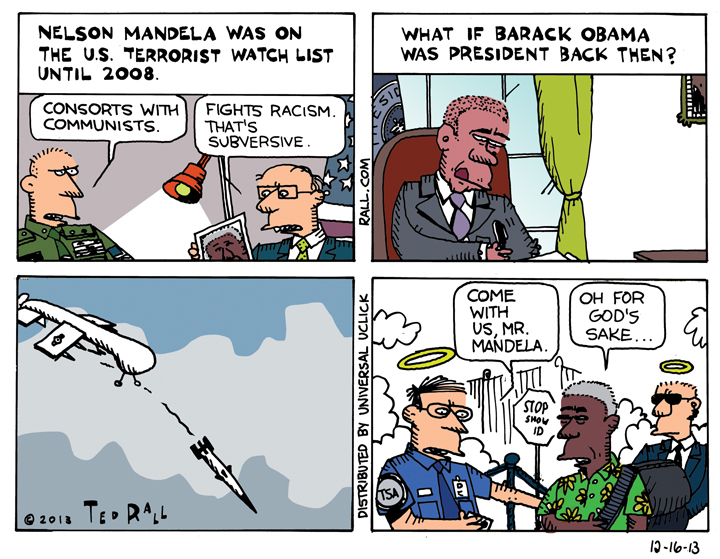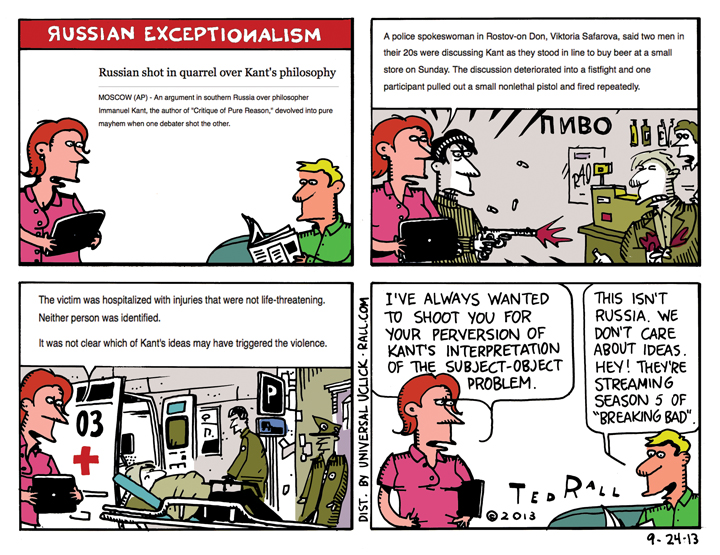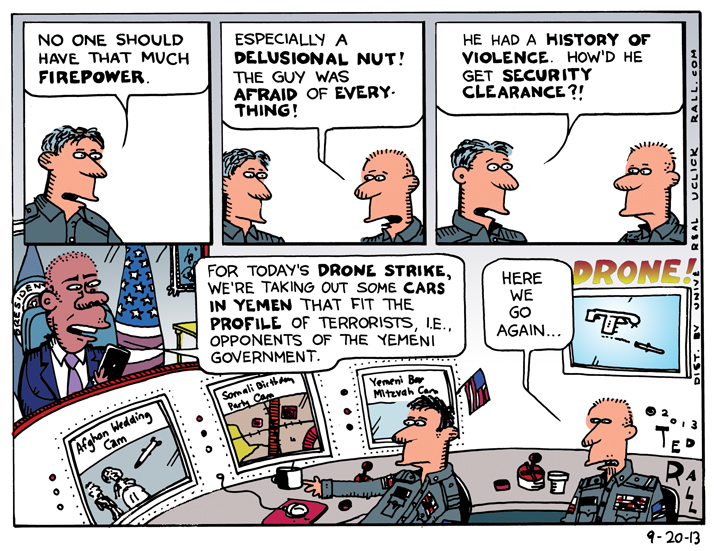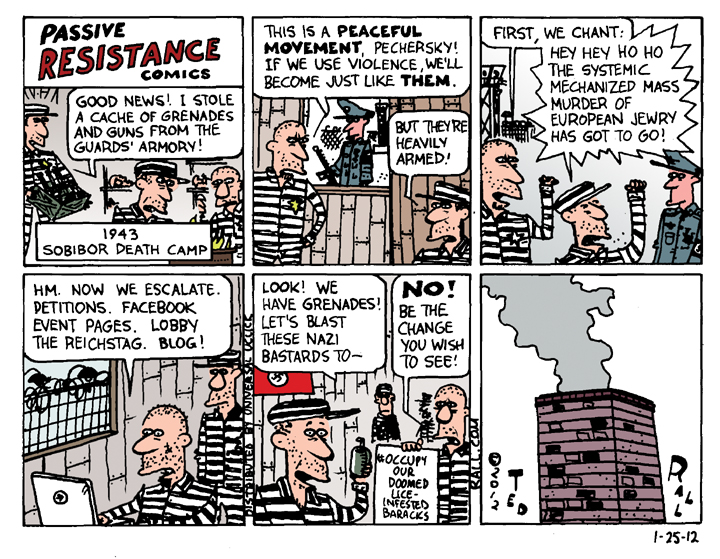Nelson Mandela was on the U.S. terrorist watch list until 2008. Under President Obama, terrorists are subject to summary termination by drone strike. What would have happened to Mandela had Obama been president before 2008? Boom!
Too Much Firepower
After a gunman shot 12 people at the Washington Navy Yard, gun control advocates wondered aloud: what will it take for America to pass common-sense gun control legislation? But the questions they asked about the shooter — why didn’t anyone stop him despite his history of violence? — could just as easily apply to more prominent figures than the lone gunman.
SYNDICATED COLUMN: 7 Questions You Should Ask About Syria
Lightening-Quick Obama Makes Bush’s “Rush to War” Look Slow and Methodical
Ten years ago, George W. Bush and his henchmen were beginning their war against Iraq. They wanted to invade hours after 9/11. But conning Congress and the public into invading a country that posed no threat to us delayed the invasion until March 2003. This week, as the media celebrates the 50th anniversary of the March on Washington and Martin Luther King’s iconic speech, it is shock- and awe-inspiring to see how far America has come. Where it took a white president a year and a half to pour on enough lies of omission, contextual lapses and leaps of logic to gin up a stupid, illegal war in the Middle East, our black president did it in a week.
Here we go again. A Baathist autocrat is in American crosshairs. The justification: WMDs. Also, he “kills his own people.” Which we haven’t cared about before. But: WMDs.
Ten years ago, the Baathist tyrant of Iraq denied the WMD accusations and invited UN weapons inspectors to verify his claim. Which they did. Because he was telling the truth. But the Bushies didn’t want to wait. No time! Had to invade right away!
And: again. “At this juncture, the belated decision by the regime to grant access to the UN team is too late to be credible,” an Obama official said five days after Syrian troops allegedly fired poison gas into a neighborhood on the outskirts of Damascus, killing over 1000 people.
“Too late”? Really? Assad’s government OKed the inspection less than 48 hours after the UN asked. On a weekend. I have editors who don’t get back to me that quickly. Doesn’t seem like a slow response from a government that doesn’t have diplomatic relations with the U.S. Also, they’re kinda busy fighting a civil war.
Now is a good time to think about some things the American mainstream media is omitting from their coverage — concerns strikingly similar to issues that never got discussed back in 2002 and 2003.
1. “Chemical weapons were used in Syria,” Secretary of State John Kerry says. Probably. But by whom? Maybe the Syrian army, maybe the rebels. Experts tell NPR: “The Free Syrian Army has the experience and perhaps even the launching systems to perpetrate such an attack.” Maybe we should ease off on the cruise missiles before we know which side is guilty.
2. Assuming the attack was launched by the Syrian army, who gave the order to fire? Maybe it’s Assad or his top generals. Assad denies this, calling the West’s accusations “nonsense” and “an insult to common sense.” Which, when you think about it, is true. As Barbara Walters and others who have met the Syrian dictator have found, Assad is not an idiot or a madman. He is a well-educated, intelligent man Why would he brush off Obama’s “red line” about the use of chemical weapons last year? His nation borders Iraq, so it’s not like he needs reminders of what happens when you attract unwanted attention from the U.S. Why would Assad take that chance? His forces are doing well. If the attack came from Assad’s forces, maybe it originated on the initiative of a lower-level officer. Should the U.S. go to war over the possible actions of a mid-ranked army officer who went rogue?
3. “The options that we are considering are not about regime change,” says the White House PR flack. So why is Obama “days away” from a military strike? To “send a message,” in Beltway parlance. But the air war that the attack on Syria is reportedly being modeled after, Clinton’s campaign against Serbia during the 1990s, caused the collapse of the Serbian government. Regional players think, and some hope, that degrading Assad’s military infrastructure could turn the war in favor of the Syrian rebels. If toppling Assad isn’t Obama’s goal, why chance it?
4. When you bomb one side in a civil war — a side that, by the way, might be innocent of the chemical attack — you help their enemies. Assad is bad, but as we saw in post-Saddam Iraq, what follows a dictator can be worse. Syria’s rebel forces include radical Islamists who aren’t very nice guys. They’ve installed Taliban-style Sharia law in the areas they control, issuing bizarre edicts (they’ve outlawed croissants) and carrying out floggings and executions, including the recent whipping and fatal shooting of a 14-year-old boy for making an offhand remark about Mohammed. Obama is already sending them arms and cash. Should we fight their war for them too?
5. Why are chemical weapons considered especially bad? Because the U.S. has moved on to other, more advanced ways to kill people. And because we claim to be exceptional. Paul Waldman of The American Prospect notes: “We want to define our means of warfare as ordinary and any other means as outside the bounds of humane behavior, less for practical advantage than to convince ourselves that our actions are moral and justified.” And, as Dominic Tierney argued in The Atlantic, “Powerful countries like the United States cultivate a taboo against using WMD partly because they have a vast advantage in conventional arms.” If 100,000 people have died in Syria during the last two years, why are these 1000 deaths different?
6. White phosphorus is a chemical weapon that kills people with slow, agonizing efficiency, melting their bodies down to their bones. The U.S. dropped white phosphorus in Iraq, notably in the battle of Fallujah. The U.S. uses depleted uranium bombs in Afghanistan. Those are basically chemical weapons. The U.S. uses non-chemical weapons that shock the world’s conscience, such as cluster bombs that leave brightly colored canisters designed to attract playful children. Assuming the Assad regime is guilty as charged of the horrors in Damascus, why does the U.S. have the moral standing to act as jury and executioner?
7. Why us? Assuming that military action is appropriate in Syria, why is the United States constantly arguing that we should carry it out? Why not France, which has a colonial history there? Or Turkey, which is right next door? Or, for that matter, Papua New Guinea? Why is it always us?
Because our political culture has succumbed to militarism. Which has made us so nuts that we’ve gone from zero to war in a week. Which brings up a quote from the “forgotten MLK,” from 1967: “I knew that I could never again raise my voice against the violence of the oppressed in the ghettos without having first spoken clearly to the greatest purveyor of violence in the world today — my own government.”
Some things never change.
(Ted Rall’s website is tedrall.com. Go there to join the Ted Rall Subscription Service and receive all of Ted’s cartoons and columns by email.)
COPYRIGHT 2013 TED RALL
Incrementalism on the March
After a mass shooting at Sandy Hook elementary school claimed 28 lives, Pres. Obama and other politicians said that there was finally political will to do something about gun control. But then incrementalism reared its ugly head once again. Now members of Congress say that the only thing we can expect out of this session will be legislation governing the number of bullets that go into the magazines used by semiautomatic weapons. You still end up dead. But you might get to have an open casket funeral.
Rape as God’s Will
Republican Mitt Romney’s campaign says he still supports Indiana Senate candidate Richard Mourdock after Mourdock said “God intended” pregnancies that result from rape. The campaign has not asked Mourdock to pull a TV ad featuring Romney. Mourdock, who has been locked in one of the country’s most expensive and closely watched Senate races, was asked during the final minutes of a debate Tuesday night whether abortion should be allowed in cases of rape or incest. “I struggled with it myself for a long time, but I came to realize that life is that gift from God. And, I think, even when life begins in that horrible situation of rape, that it is something that God intended to happen,” Mourdock said.
This time: I explain Republican science.
SYNDICATED COLUMN: Occupy Wall Street – What Comes Next?
Things Have Changed. Time to Adapt.
The Occupy National Gathering, held July 1-4 in Philadelphia, perfectly captures the current state of Occupy Wall Street.
First, the cops pushed the Occupiers around, refusing them space in Independence Park. They wound up in Franklin Square. (Just like old times. In September 2011 Occupiers found Wall Street blocked off by the NYPD. Zuccotti was ad hoc option two.)
Second, the Philly confab was wimpy and watered-down. When one of your honored guests is Daryl Hall of the 1980s duo “Hall & Oates,” militancy is probably off the menu.
Third, the Occupiers weren’t really Occupiers (though many no doubt didn’t know that they’d been coopted by Democratic Party operatives). ONG was yet the latest attempt by front groups set up by MoveOn.org in order to channel the energies of the OWS movement into the Obama reelection campaign.
“What’s going on with Occupy?” people ask me. “We don’t hear anything about them anymore.” By which they mean, they haven’t seen or read anything about OWS in the corporate media. They also probably haven’t “heard” about the enormous street protests in Montreal, which routinely draw 400,000 to 500,000 people, or about Bill 78, a law passed by Quebec’s parliament that suspends the rights of free speech and assembly, which has transformed the province into a police state, or that the real unemployment rate—the way it was calculated before 1980—is 23 percent.)
When your media is this far gone, you don’t “hear” much.
Some say Occupy is dead. Others disagree. “Occupy Will Be Back,” liberal writer Chris Hedges wrote recently.” It is not certain we will win. But it is certain this is not over.” (I don’t know who this “we” is. As far as I’ve heard, the squishy former New York Times journo’s role at Occupy has been limited to book-shilling.)
As a person who helped plan the event that initially sparked OWS; as one who was thrilled by its instant popularity, potency and potential; as someone who participated in the branch of OWS in my own community through the winter, including direct action confronting the authorities—and as a long-time student of historical crises and revolutionary movements—I think it’s less important to guess whether Occupy has a future than to examine how a movement with widespread public support from left and right alike devolved from nearly 2000 public encampments to its current situation: marginalization and cooption.
That said, this summer offers good opportunities for OWSers to make some noise. Occupiers will protest the two major party conventions later this summer. The longer the campaign goes on without either candidate seriously engaging jobs and the economy—hands down the most important issue in Americans’ minds—in a credible way, the more removed from reality the political horserace and its media carnival barkers become, the longer the suffering goes on (and suffering, we sometimes forget, is cumulative, each pain and setback exponentially building upon the last), the more appealing Occupy, or perhaps some more aggressive successor, will be.
Whether the first major street movement since the 1960s survives, grows or metastasizes, we must learn the lessons of Occupy’s first year.
Like every political system, every movement contains the seeds of its future demise. OWS began with an unsustainable premise: occupy public space, yet remain nonviolent. What happens when the cops show up? You leave peacefully. Game over. Which, with the exception of Occupy Oakland—an interesting exception, insofar that clashes with the police increased popular support—is what happened everywhere from lower Manhattan to City Hall Park in Los Angeles.
Occupy should have permitted resistance, violent and/or nonviolent. That, or it shouldn’t have camped out in parks in the first place. Similar movements, in Spain and Russia for example, operate out of offices and churches and use flash-mob tactics to carry out hit-and-run direct actions against banks and other targets. If you’re going to make an Alamo-like stand, well…make a stand.
As I and just about everyone else pointed out at the time, moreover, camping out in the cold sucks. A dumb tactic for a movement that began in the fall and intended to last indefinitely.
Occupy has been overly inclusive. As a reaction to and rejection of the two big corporate-backed political parties, OWS was inherently radical. Yet for week after week, month after month, General Assemblies all over the country have been disrupted and hijacked by liberals, Democrats, and other traditional partisans who don’t share the OWS ideology of non-partisanship and non-affiliation with Ds or Rs, and militant resistance to their backers, the banksters and other corporate hucksters.
Others have criticized OWS’ unwillingness and/or inability to issue a list of demands. Not me. I have seen how the debates within Occupy have empowered voiceless men and women who used to think politics was for politicians. It was—is—powerful.
Let the oppressors try to guess how we may be mollified, how they might avoid revolution. Demands, we believed, would define us too narrowly and separate us from one another.
But things have changed.
We have been kicked out of our encampments. Occupy groups in numerous cities have split into radical and reformist (liberal and/or Democratic) factions.
There really is no place for the liberals within Occupy. Democratic apologists should go where they belong, to volunteer for Obama, to waste their time and money on the torturer of Guantánamo, the drone murderer of Waziristan, he who golfs while the 99% watch their wages shrink and their homes taken away, he who extended his “good war” against Afghanistan through 2024.
We real Occupiers, we radicals, should come together around a list of demands that define us, and allows the wait-and-see public what we’re about, to understand that we are fighting for them—demands that a somewhat reasonable and responsive government would agree to, but cannot and will not because it would counter their insane, addictive greed, their lust to control and own everything, everywhere, everyone.
They even trademark the germs.
There should be demands for justice: prison sentences and fines for the politicos and corporate executives of those whose behavior was not only reprehensible but illegal, along with the seizure of their companies and their properties for the public good. One would start, naturally, with the President.
There should be demands for redress: payments and other material compensation for those who were the victims of crimes, economic and otherwise. Torture victims need counseling and homes, and deserve punitive and compensatory damages; those who lost their homes to illegal foreclosures need not only their old lives back, but also interest and cash penalties to serve as a deterrent to those tempted to engage in such behavior again; the same goes for those who rotted in prison for non-criminal “crimes” like using drugs.
And there should be demands for systemic changes: opening up ballots to third parties; making it illegal for elected representatives to talk to businesspeople, much less accept contributions from them; rigorously enforcing the constitution, laws and treaty obligations so that, for example, Congress gets back the exclusive right to wage war; expanding the Bill of Rights to include such obvious 21st century necessities as a right to a college education should a citizen desire one, a right to a living wage that doesn’t depend upon the whims of local employers, and a right to be treated for any illness, without charge, just because you’re American and you live in the wealthiest society that has ever existed, anywhere.
(Ted Rall’s new book is “The Book of Obama: How We Went From Hope and Change to the Age of Revolt.” His website is tedrall.com.)
(C) 2012 TED RALL, ALL RIGHTS RESERVED.
SYNDICATED COLUMN: The Occupier’s Choice: Violence or Failure
Don’t Know What They Want, But They Know How To Get It
Here’s how U.S. state-controlled media covered events at Occupy Oakland:
“A day of demonstrations in Oakland that began as a significant step toward expanding the political and economic influence of the Occupy Wall Street movement, ended with police in riot gear arresting dozens of protesters who had marched through downtown to break into a vacant building, shattering windows, spraying graffiti and setting fires along the way,” reported the AP.
Then they quoted an Occupy Oakland member: “‘We go from having a peaceful movement to now just chaos,’ said protester Monique Agnew, 40.”
The lede of this November 3rd AP story frames a larger narrative. “Political and economic influence” cannot be achieved through violence. Ms. Agnew’s quote is used to support that framing. The move from “peace” to “chaos” represents a setback for the Occupy movement.
Violence = tragedy.
Considering that recorded history does not include a single instance of a nonviolent movement effecting radical change, it is interesting that anyone would argue that violence is by definition a negative development. It is equally astonishing that anyone would believe it.
In a revolution, one set of elites gets supplanted by another. There has never been a nonviolent revolution.
Never.
Gandhi was nonviolent. But his allies did resort to violence on numerous occasions. And India wasn’t a revolution. It was an independence struggle. The rich remained rich; the poor stayed poor. Conversely, there has never been a revolution in which violence was the primary tactic. Even the bloodiest revolutions—France, Russia, China—relied more on national strikes, sabotage, marches and demonstrations than shooting people. Revolutions are mostly nonviolent. But violence must always part be of the revolutionist’s toolkit.
Movements move.
Sometimes against the will of many of its members, the nascent Occupy movement is being propelled forward into its second phase: increasingly direct confrontation with the security apparatus of the American police state. The consideration of violence as a tactic is the inevitable result of Occupy’s own internal logic, resulting from a combination of its timing—at a time when revolution is needed and desired by millions of Americans, it’s the only insurrection in town—and its leaderless structure.
Never in history have the wealthy or powerful voluntarily relinquished substantial amounts of money or power. The corporate elite and the political class that enables them—the “1%,” as Occupy calls them—will never give into the Occupier’s demands to reduce their power or wealth unless faced with violence or the credible threat thereof.
As Peter Gelderloos writes in his book How Nonviolence Protects the State: “Time and again, people struggling not for some token reform but for complete liberation—the reclamation of control over our own lives and the power to negotiate our own relationships with the people and the world around us—will find that nonviolence does not work, that we face a self-perpetuating power structure that is immune to appeals to conscience and strong enough to plow over the disobedient and uncooperative.”
If voting or writing letters to the editor worked, we wouldn’t need Occupations.
The Occupy movement can wind up in one of two ways:
Failure.
Or success, partly via the occasional use of violence and/or the credible threat of violence that results from those sporadic outbursts.
First let’s define terms. Vandalism, theft and destruction of property are not violence. Inanimate objects do not suffer. Violence can only be inflicted upon living beings. Breaking a window may or may not be morally justified, but it is never violence. Further, violent self-defense is not the same as violence. Until now the violence at the Occupations has all been initiated by the police. When policemen fire rubber bullets, bean bags, tear gas and pepper spray at unarmed, peaceful protesters, their victims have every right to defend themselves—to run away, to avoid arrest and yes, to strike back.
Every civilized society recognizes the right to self-defense.
Perhaps because they were retroactively spooked by the bombings, bank robberies and kidnappings that marked the disintegration of the Vietnam protest movement, throughout the last 40 years American leftists have adhered to a strict code of militant nonviolence. Abandoning the tactics of disruption and non-cooperation (both of which were central to Gandhi’s approach), demonstrators’ ridiculous cooperation with government authorities reduced progressivism to farce.
Marchers apply for permits on public streets. Organizers give the police pre-printed lists, last name first, of activists who volunteer to be arrested; they are quickly booked and released, rarely less than $100 poorer. It is theater, a mere pantomime of genuine protest.
And it never works. You need only look back at the political history of the United States between 1971 and 2011 to see what 100% nonviolence has accomplished. Even under Democratic presidents and Congressional majorities, the Left has lost one battle after another.
The Left’s only major victory during that period followed the 1999 Battle of Seattle. Riots and broken windows disrupted the World Trade Organization for years. Countless American jobs were saved as a result. Yet liberals were ashamed.
Violence! How terrible!
Not as terrible as the wars and the massive unemployment, apparently.
At the core of the cowardice of protests carried out by establishment liberals has been slavish adherence to nonviolence at all cost. At most protests over the past few decades self-appointed “peace police” patrol the edges of crowds penned into “free speech zones” (which are inevitably placed out of the way, far from cameras). The peace police don’t lift a finger to protect demonstrators against police brutality. Instead, they act to prevent protesters from doing anything to “provoke” the cops, even when they are trying to protect themselves from brutality.
What makes the Occupy movement different and so compelling is that it moves beyond going-through-the-motions toward real resistance against tyranny for the first time since the 1960s. Seizing territory without a permit and refusing to relinquish it, as has happened at Occupy Wall Street and hundreds of other cities, presents an inherent threat to the system. The authorities can’t win no matter what they do.
They can’t do nothing. Tolerance signals legitimacy, even tacit approval of OWS and their message that rich individuals and big corporations have too much wealth and control over us. Can’t have that. Rupert Murdoch’s house organ, the New York Post, ran a front-page editorial on November 3rd screaming: “Enough!”
But crackdowns make the movement grow even bigger. A video of a NYPD official pepper-spraying four women at OWS without provocation inflamed public opinion and drew more people to Manhattan’s Zuccotti Park. An announced plan to evict OWS was scrapped after hundreds of people traveled there to gird for battle.
Speaking for New York’s business community as well as Murdoch, the Post editorialized: “Time’s up. The Zuccotti Park vagabonds have had their say—and trashed lower Manhattan—for long enough. They need to go. Be it voluntarily—by packing their tents and heading off in an orderly fashion. Or by having the NYPD step in—and evict them.” They blame OWSers for urinating outside. Which merely reminds New Yorkers how unresponsive their government is: there are no public restrooms in Manhattan.
You can smell the fear along with the pee.
Meanwhile, as politicians feel more pressure to crack heads, Occupations will have to move indoors. Freezing temperatures have arrived in New York and much of the country. Tensions will rise. As clashes with the authorities intensify, the ridiculous fetish of nonviolence—a faith-based tactic with no more basis in historical fact or reality than creationism—will be forgotten and, one day soon, laughed at.
(Ted Rall is the author of “The Anti-American Manifesto.” His website is tedrall.com.)
COPYRIGHT 2011 TED RALL







